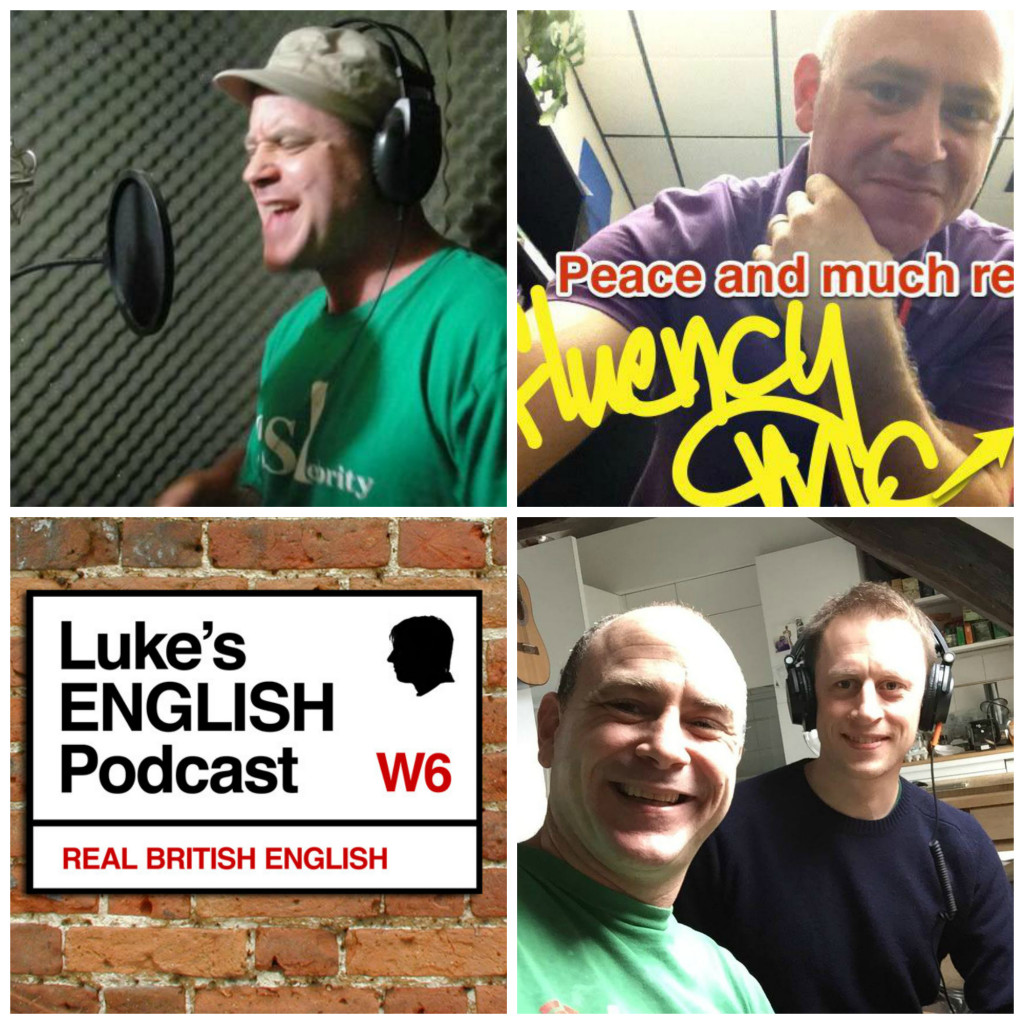Chatting and rapping with Jason R. Levine aka Fluency MC! [Download]
![]() I’m feeling pretty excited today because I’ve got a bit of a celebrity on the podcast. Jason R. Levine, also known as Fluency MC is something of a legend in the world of online English language teaching. He’s become pretty well known on YouTube in particular for his videos in which he uses hip hop to bring a fresh approach to teaching English. Jason raps his English lessons, and many of those raps have become YouTube sensations – for example “Stick stuck stuck” the past participle rap (over 2.5million views on Youtube), and the present perfect rap which is a full on explanation of the grammar rules for the present perfect tense, delivered in rhyme. But, Jason is not only a teacher who raps – a look at Jason’s CV shows that he is involved in a number of very interesting English teaching projects – he leads workshops, has published material and is an English specialist for the US department of State – which makes him sound like a government agent, and he has a very interesting academic and personal background which has led him to take this fresh new approach to language teaching. On the musical side, Jason raps but he also plays the drums like me, and he DJs and produces his own tunes. There’s so much to ask him and so much to talk about, and hopefully Jason will do some rapping on Luke’s English Podcast too, and who knows – I might even get involved in that as well. You can look forward to all of it in this episode. (In fact, if you listen to the whole episode you will hear both Jason and me rapping on some of my brother’s music)
I’m feeling pretty excited today because I’ve got a bit of a celebrity on the podcast. Jason R. Levine, also known as Fluency MC is something of a legend in the world of online English language teaching. He’s become pretty well known on YouTube in particular for his videos in which he uses hip hop to bring a fresh approach to teaching English. Jason raps his English lessons, and many of those raps have become YouTube sensations – for example “Stick stuck stuck” the past participle rap (over 2.5million views on Youtube), and the present perfect rap which is a full on explanation of the grammar rules for the present perfect tense, delivered in rhyme. But, Jason is not only a teacher who raps – a look at Jason’s CV shows that he is involved in a number of very interesting English teaching projects – he leads workshops, has published material and is an English specialist for the US department of State – which makes him sound like a government agent, and he has a very interesting academic and personal background which has led him to take this fresh new approach to language teaching. On the musical side, Jason raps but he also plays the drums like me, and he DJs and produces his own tunes. There’s so much to ask him and so much to talk about, and hopefully Jason will do some rapping on Luke’s English Podcast too, and who knows – I might even get involved in that as well. You can look forward to all of it in this episode. (In fact, if you listen to the whole episode you will hear both Jason and me rapping on some of my brother’s music)
I’ve never met Jason before, this is the first time I’ve spoken to him in fact. I always thought Jason lived in New York, but a while ago I was on Facebook and I saw a photo of him in Paris and I assumed he’d visited for work or for a holiday, so I sent him a message saying “next time you’re in Paris, how about an interview for LEP” and he wrote back saying “Actually, I live in Paris”. Needless to say I was pretty surprised. What are the chances of that!? So naturally, I thought I’d take the opportunity to hook up with him and interview him for the podcast, and he’s sitting right next to me now so let’s get started…
Links
Click here for Jason’s YouTube Channel
Click here for colloandspark.com Jason’s website
This is FluencyMC’s Facebook page
Questions & Stuff
These are some questions that we covered in this episode of the podcast.
I’m really chuffed to have you on the podcast Jason, because as we heard in my introduction you’re sort of a living legend of English teaching. Are you famous?
What are you most known for?
What other projects are you involved in?
Where are you from?
What did you study at university?
How does psychology come into your teaching method?
How long have you been teaching?
How did you get into it?
When did you first start rapping in the classroom? Was there one particular time when you first did it? What happened?
You travel quite a lot, teaching in different locations. Do you always rap in class?
How would you describe your approach to teaching?
How is rapping a part of that?
What are the reactions of your students to your method?
What’s collo and spark? Can you explain that?
Is it related to mnemonics?
FluencyMC on YouTube
This is the original video of Jason rapping “Stick stuck stuck” – just about 3.5minutes of one of his lessons.
Luke’s Rapping (Lyrics Below)
Here are the lyrics of my rap at the end of this episode!
The Well-Spoken MC (Lyrics)
Microphone check one two one two
Let me introduce myself to you
My name’s Luke
I’m an ordinary dude
I like food, I wear shoes
I like to watch YouTube
I’m just like you,
or maybe Doctor Who
when I’m in a good suit
I’m feeling in the moodfrom time to time
I like to unwind
I Drink a bit of wine
and try to write a rhyme
and when I combine
all of this all online
then surely it’s a sign
it’s my time to shine,
cos I like to feel fine
I do it all the time
and in my mind
I’m going to get mineIt’s just a natural fact
and I like it like that
so relax and sit back
and listen to this track
It’s just a natural fact
and I like it like that
so relax and sit back
and listen…I get dizzy
with a bit of thin Lizzy,
while drinking some fizzy
getting busy with Queen Lizzy
I’m a gentleman
With a lesson plan
I’ll Help you understand it with a diagram
Of different tenses
and complex senses
or ways of saying sentences with different kinds of emphases
Yes
You could say I’m blessed
With a CELTA and a DELTA and my CV’s fresh!
I teach pronunciation
Throughout the nation
To stop alienation
Caused by poor articulation
It’s just a natural fact
and I like it like that
so relax and sit back
and listen to this trackCos I speak like a native
and I’m here to get creative
and I have already stated
that I’m very qualificated
I’ve got a wide CV
an even wider TV
which I’d like you to see
in Confidentiality
Because between you and me
and the deep blue sea
One day I’m going to be
On the BBCBecause I’ve got that BBC style
The one that makes you think for a little while
about the way most newsreaders speak
It sounds as if they’re trying to repeat
Sentences of information But With crazy intonation
and weird enunciation that’s clearly fascinating
And at the end of every news report
There is a summary of sorts
Of all the main sports, and some afterthoughts
Where the main news anchor
Turns to the camera
And delivers an answer
in the form of a mantra
This is the voice of the BBC,
and while you’re sitting there drinking cups of tea
We’re working away inside your TV
And on the screen you will surely see
that I go by the name of the Well-Spoken MC











